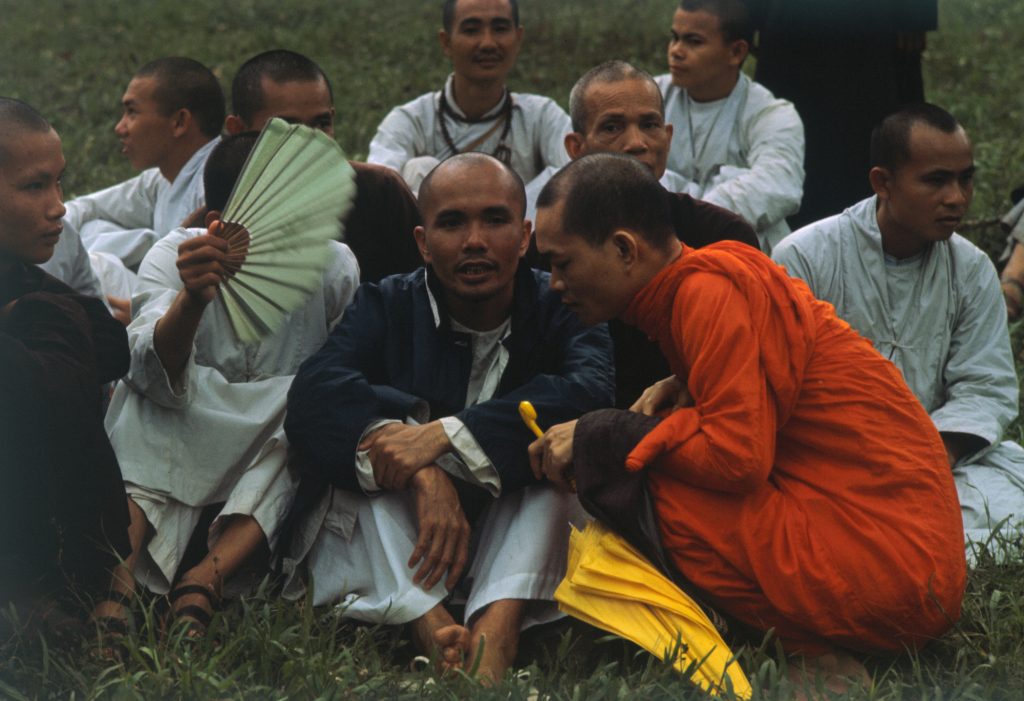Nothing is permanent, so everything is precious. Here’s a selection of some happenings—fleeting or otherwise—in the Buddhist world this week.
Thich Tri Quang, Vietnamese Buddhist Monk and Wartime Activist, Dies
The Vietnamese Buddhist monk Thich Tri Quang, best known for his role as a powerful political dissident during the Vietnam War, died on November 8 in Hue, Vietnam, according to the Washington Post. He was 95. In 1963, Tri Quang led protests that helped oust the president of South Vietnam, Ngo Dinh Diem, in a US-backed coup. Diem’s strong ties to the Catholic church (his brother was an archbishop) made him extremely unpopular with the Buddhist majority at the time. For Tri Quang, Buddhism and Vietnamese national identity were fundamentally linked. Commenting on the politics of Tri Quang and his fellow protestors, Edward Miller, professor of history at Dartmouth College, told the Post, “When it comes to the Vietnam War, I think that Americans and others always tend to try to fit everything that happened . . . into this Cold War framework, where it’s all about communism or anti-communism. In the case of Tri Quang, I think the key to understanding him is that he was first and foremost a Buddhist and a nationalist.”
Hostilities between the government and protestors reached a breaking point on May 8, 1963, when South Vietnamese soldiers fired on a group flying a Buddhist flag in Hue, killing nine people. A month later, Buddhist monk Thich Quang Duc doused himself with gasoline and sat in a meditative posture as he burned to death. An iconic photograph of the ritual suicide forced the US to reconsider their support for Diem. After Diem was assassinated in a military coup in November 1963, Tri Quang continued to mobilize his followers to help unseat a succession of leaders; in 1966, he organized a second Buddhist uprising against the government of Prime Minister Nguyen Cao Ky. That year, Tri Quang appeared on the cover of Time magazine; an accompanying article described the monk as “South Vietnam’s mysterious High Priest of Disorder” with a “sensual electricity in every gesture and blazing eyes that can mesmerize a mob.” Little is known about Tri Quang’s life after the end of the Vietnam War.
Anti-nationalist Monk Granted Bail After Criticizing Myanmar’s Military
A court in Myanmar granted bail to Buddhist monk Myawaddy Sayadaw (Sayadaw U Arriyawuntha), who faces defamation charges for criticizing the country’s military in an interview with local news website Khit Thit, according to Myanmar newspaper the Irrawaddy. In June, Myawaddy Sayadaw, who is the abbot of Myawaddy Mingyi Monastery in central Myanmar, said that the ultranationalist group Buddha-Dhamma Parahita Foundation (BDP), previously known as Ma Ba Tha, broke sangha rules of conduct when it accepted a 30 million kyat ($20,000) donation from an army commander. Buddhist nationalism has helped fuel the Myanmar military’s genocidal violence against the Rohingya, a Muslim ethnic minority, in the Rakhine state. The persecution has forced hundreds of thousands of Rohingya to flee to refugee camps in neighboring Bangladesh. Myawaddy Sayadaw called the military “thieves and robbers” and accused them of undermining democracy, intimidating civilians, and illegally occupying seats in parliament. Myawaddy Sayadaw has a record of working with peace and interfaith groups. He addressed the public outside court on November 7, stating, “The lawsuit clearly shows the military is trying to block criticism. But I will not stop and I will continue with what I have to do.” If he loses the lawsuit, Myawaddy Sayadaw could face up to two years in prison.
Korean Jogye Order Hosts Buddhism Expo in Seoul
South Korea’s largest Buddhist group, the Jogye Order, is sponsoring and organizing the 2019 Seoul International Buddhism Expo (BEXPO), which began on Thursday and will run through Sunday, November 17. The event, held at the Seoul Trade Exhibition and Convention center, features conferences, talks, and booths representing more than 400 Buddhist-affiliated companies. The expo consists of three sections: an area highlighting new trends in meditation technology; the 7th Buddha Art Festival (BAF), featuring both traditional and contemporary works; and an interior design and product exhibition hall where visitors can browse decor for their personal meditation rooms, according to Business Wire. The Jogye Order dates back to when Korean monk Doui brought Seon (Jp. Zen; Ch. Chan) from China to Korea around the year 820 C.E. In 2005, the Joyge Order accounted for at least 81 percent of the 907 major Buddhist temples in Korea.
Thai Festival of Lights Improves Its Trash Problem
On Monday, people in Thailand celebrated Loy Krathong, the annual “festival of light” that marks the end of the rainy season, by releasing decorated candle-lit baskets called krathong into local rivers—a practice that in recent years has contributed to pollution and clogged up waterways. Loy Krathong coincides with Yi Peng, a celebration where sky lanterns are released into the air. The Yi Peng lanterns have added to the trash problem and have set fire to powerlines. In 2015, over six tons of waste was removed from rivers after the festival, the Bangkok Post reported. In 2017, at least 78 flights were canceled at Chiang Mai Airport due to the hazard to aircraft caused by the floating lanterns. The Thai government has since issued new restrictions on the festivals to cut back on the hazards and waste, and the rules appear to be working. This year, participants in Bangkok released 40 percent fewer krathong, 96 percent of which were made from biodegradable material, marking a dramatic decrease in the use of styrofoam, the Thai newspaper Khao Sod English reported, citing government data.
♦
Further reading: If you enjoyed this week’s Buddha Buzz, you may want to read Thomas Tweed’s essay on Buddhism and Islam in the American Imagination, a brief explanation on Buddhist monks and self-immolation, or this article on the anti-Rohingya racism behind Myanmar’s Buddhist nationalism.
Thank you for subscribing to Tricycle! As a nonprofit, we depend on readers like you to keep Buddhist teachings and practices widely available.
